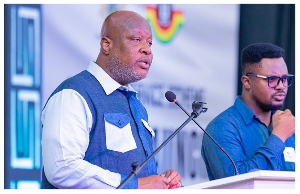 Mr. Samuel Zan Akologo, Executive Secretary of Caritas Ghana
Mr. Samuel Zan Akologo, Executive Secretary of Caritas Ghana
Mr. Samuel Zan Akologo, Executive Secretary of Caritas Ghana has observed that recent incidences of defilement cases in Ghana are signs of a weakening system of social protection for the vulnerable in society.
“The recent incidences in our country of defilement of minors and disruptions to the school feeding programme in some very poor communities that left children without their daily ration of food are not only worrying but are also signs of a weakening system of protection for the vulnerable,” he said.
Mr. Akologo made the observation in Wa during the opening session of the National Seminar on “Ensure no One is Left Behind” in Ghana’s implementation of the Sustainable Development Goals (SDGs).
He noted that internationally, the rhetoric on social protection seems to be growing since 2015 with phrases like ‘Ensure no One is Left Behind’, social protection floors, reduce inequalities, and infrastructure for poverty reduction among others.
“The evidence of action in favour of social protection remains elusive and scanty, at best,” he said and called for the need to push for demonstrable commitment by public policy actors and architects of national development plans.
“It is no longer acceptable that the weak, poor, marginalized and vulnerable in society are an after-thought of planned policies and development programmes,” he said.
Mr. Akologo explained that the principle of “Ensure no One is Left Behind” meant a conscious policy and programming direction that aimed to reach first those furthest behind or at the periphery of society.
On the seminar, Mr. Akologo explained that it was part of Caritas Ghana’s endeavour to promote the implementation of the Sustainable Development Goals (SDGs) in a manner that left no one behind.
He noted that the experience of the erstwhile Millennium Development Goals (MDGs) should guide the implementers not to fall back to the complacency of statistical aggregates.
“For instance, some countries in Africa, including Ghana, reported on significant progress in attainment of the MDGs by merely using statistical aggregates; whereas the reality of the poor in those countries only got worse, in many respects,” he emphasized.
He said the seminar was building on the work began last year (2016) by Caritas Ghana in assessing the status of Ghana’s implementation of the SDGs with a report titled “Bringing the SDGs to life in Ghana”.
“We are continuing with this dialogue on the SDGs to ensure that everyone, and especially the poor themselves, understand how they will be accounted for when measuring progress with the SDGs,” he added.
Mr. Akologo said the seminar intended to investigate the possibility with the National Social Protection Policy under the Ministry of Gender, Children and Social Protection as a framework of ensuring no one was left behind.
He said it also wanted to explore small-holder agriculture and rural development initiatives as another entry point to better and effectively target the poor.
The seminar provided space to learn from the experiences of some Churches and civil society in specific targeting of social services to the poor and vulnerable.












